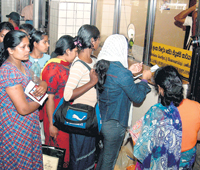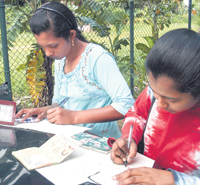|
Lack of recognition for migrant workers Call for Presidential Commission of Inquiry Sri Lankan migrants, numbering at least one million workers overseas at any given time, are tremendously contributing to the growth of banks, telephone and postal companies, passport office, tourism, the Colombo airport, transportation and construction – but get little in return.
“While other foreign earnings sectors like garments get many benefits and tax breaks, the migrant worker industry – which is a largest employer – and the highest return on foreign earnings (because little is used overseas) gets just a little support from the state or other stakeholders,” noted Suraj Dandeniya, former President of the Association of Licensed Foreign Employment Agents (ALFEA) reflecting on migrant worker issues in the backdrop of the Lebanon crisis.
Dandeniya, who has for long worked on measures to bring some balance between employment agencies, state agencies and migrant workers to ensure the latter is treated with respect, says the appointment of a presidential commission is essential to examine all issues relating to migrant workers and come up with a proper policy and strategy. “That becomes very current (given the situation in Lebanon) and the way our authorities are handling the repatriation of our workers,” he said, also raising a valid point: Why should some 250,000 migrant workers who go abroad every year pay the airport tax that is used to develop tourism? Why not plough that money back to help migrant workers? Excerpts of the interview: The migrant worker industry doesn’t get subsidies while exporters in garments and tea get. There are subsidies for other sectors too if employment generation is there. Migrant workers provide support and added employment to a host of sectors like sub agents (in the village), city job agents, foreign job agent, the passport office, tourism (through airport taxes), Foreign Employment Bureau, banks, post offices, airlines ... everyone is making money from the poor migrant worker. They get nothing in return. When the Board of Investment wanted to start an investment zone at Pannala essentially to create 9,000 jobs, the cost of developing the infrastructure was Rs 6 billion. However the foreign employment industry provides 250,000 jobs overseas but no government subsidy or support is provided. When a housemaid is in trouble or has a problem and comes back – we as employment agents are answerable. None of those agencies/institutions who benefit from the industry lifts a finger to help. In the last 15-20 years the Foreign Employment has been able to raise Rs 6 billion in savings now in state banks. This is a lot of money and taken from migrant workers. The Treasury benefits from some $2 billion in foreign currency accounts. If we don’t get this money, the country is sunk. Migrant workers send home nearly 100 percent of their earnings unlike other export sectors; yet it gets a raw deal. The Telecommunications Department gets 50-60 percent of its revenue from calls originating from here to the Middle East or from there. Migrant workers buy a lot of duty free items at the airport – most of those shops at the arrival lounge are to cater to these returnees. Construction industry: Some 70 percent of migrant workers build houses from earnings providing a lot of work to contractors. The nation subsidises many things except the migrant worker industry. If a foreign investor comes into the country, he is taken to see the president with open arms. He provides just 200 jobs. But would the president meet a foreign job agent who provides 2,000 jobs a year? The Gulf Council Countries’ Medical Centre at Kollupitiya issues compulsory medical certificates to prospective job seekers. There is a panel of 10 doctor-firms with each charging Rs 3,000 per migrant. Every housemaid gets a guarantee from these medical firms that if she comes back for some reason or other, the doctors are not liable. But the agent is responsible if they return within three months of their departure and $700 is refunded to the foreign agent. All the airlines from the Middle East and SriLankan make money from these poor workers. If there was no Middle East traffic, will Emirates or Qatar or Air Arabia fly to Colombo? If not for migrant workers, we would be marooned but they don’t get the recognition they deserve. |
||||
Copyright © 2006 Wijeya Newspapers
Ltd. All rights reserved. |

